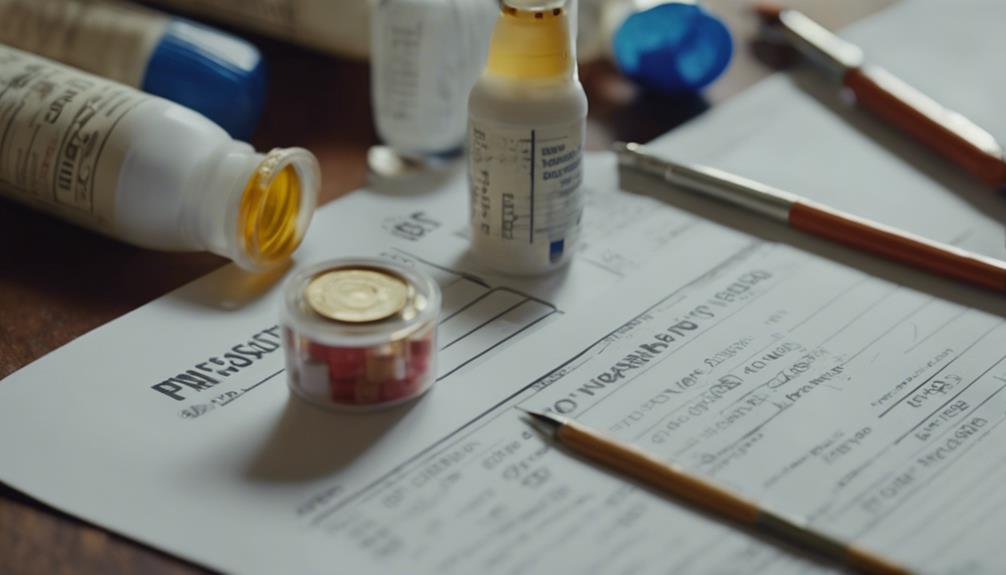Understand West Virginia Medicaid's eligibility criteria and financial assistance options to manage out-of-pocket costs effectively. Benefit from affordable co-payment requirements for emergency services and utilize programs like the Medicaid Health Insurance Premium Payment for support. Access dental, mental health, and other vital services, including prescription drug coverage with cost-saving alternatives. Be mindful of limits on out-of-pocket expenses set by federal regulations. Learn how to navigate emergency room fees based on severity and explore reimbursement processes. Ensure optimized care without excessive financial strain through knowledgeable utilization of Medicaid resources.
Emergency Medicaid Coverage Overview

In emergency situations, Medicaid coverage in West Virginia provides immediate assistance for eligible individuals in need of urgent medical care. To qualify for emergency Medicaid services in the state, individuals must meet specific eligibility criteria outlined by the program. These criteria typically include factors such as income level, citizenship status, and residency requirements.
Once deemed eligible, individuals can access a range of emergency services covered by West Virginia Medicaid, ensuring they receive the necessary medical attention without incurring significant out-of-pocket costs.
When it comes to cost-sharing for emergency Medicaid services, West Virginia Medicaid imposes minimal financial obligations on beneficiaries seeking urgent medical care. While some small copayments may apply for certain services, the overall cost-sharing requirements are designed to be affordable for individuals facing medical emergencies.
Types of Services Covered
Covering a broad spectrum of healthcare needs, West Virginia Medicaid includes various types of services to address the medical requirements of eligible individuals. Dental services coverage is an essential component of West Virginia Medicaid, ensuring that beneficiaries have access to preventive and restorative dental care. This coverage often includes routine check-ups, cleanings, X-rays, and other necessary dental procedures to maintain oral health.
Additionally, West Virginia Medicaid offers mental health services benefits to support individuals in need of psychological or psychiatric care. These benefits may encompass counseling sessions, therapy sessions, medication management, and inpatient mental health treatment when required. Ensuring access to mental health services is vital in promoting overall well-being and addressing mental health concerns effectively.
Co-Payment Requirements and Exemptions

West Virginia Medicaid implements co-payment requirements and exemptions to regulate the financial responsibility of beneficiaries when accessing covered services. Co-payment exemptions are available for certain categories of individuals based on specific criteria. These exemptions can vary depending on factors such as income level, age, disability status, and the type of service being received.
For those who don't qualify for co-payment exemptions, there are financial assistance options to help alleviate the burden of out-of-pocket costs. Medicaid beneficiaries in West Virginia can explore programs like the Medicaid Health Insurance Premium Payment (HIPP) program, which assists with paying for premiums, deductibles, and co-payments.
Additionally, the Medicaid for Low-Income Families (MLIF) program provides coverage for families who meet specific income requirements, reducing the overall financial strain of healthcare expenses.
Understanding the co-payment requirements and available exemptions, as well as being aware of financial assistance options, is crucial for West Virginia Medicaid beneficiaries to effectively manage their out-of-pocket costs while accessing essential healthcare services.
Prescription Drug Coverage Details
When it comes to understanding the specifics of prescription drug coverage within the West Virginia Medicaid program, beneficiaries need to be aware of the eligibility criteria and limitations that govern this essential aspect of healthcare access.
One key aspect to consider is the availability of generic alternatives, which can offer significant cost savings compared to brand-name medications. West Virginia Medicaid may require prior authorization for certain prescriptions, so it's important to understand this process to ensure coverage.
Additionally, there may be coverage restrictions on certain medications, meaning that not all drugs may be fully covered under the Medicaid program.
Beneficiaries should work closely with their healthcare providers to explore generic options whenever possible to maximize cost savings. It's also essential to stay informed about any prior authorization requirements and coverage restrictions to avoid unexpected out-of-pocket expenses.
Being proactive in discussing these details with healthcare providers and understanding the nuances of prescription drug coverage can help beneficiaries navigate the West Virginia Medicaid program more effectively.
Limitations on Out-of-Pocket Costs

Beneficiaries enrolled in the West Virginia Medicaid program should be aware of specific limitations that regulate their out-of-pocket costs for healthcare services. Cost sharing rules play a crucial role in determining the maximum amount individuals are required to pay for covered services.
In Medicaid, there are federally mandated limits on cost-sharing to ensure that beneficiaries aren't burdened with excessive expenses. For instance, certain groups like pregnant women and children may have lower or no cost-sharing obligations for essential healthcare services.
Additionally, payment assistance programs are available to help individuals who may struggle to meet their out-of-pocket costs. These programs aim to provide financial support to those in need, ensuring that Medicaid beneficiaries can access necessary medical care without facing financial hardship.
Understanding Emergency Room Fees
Understanding the breakdown of emergency room fees is essential for navigating healthcare costs effectively. ER visit expenses can vary widely depending on the severity of the medical condition, the treatments received, and the hospital's location.
Typically, emergency room fees encompass facility fees, physician fees, diagnostic tests, and any procedures administered during the visit. To mitigate these costs, consider cost-saving strategies like utilizing urgent care centers for non-life-threatening issues, as they often have lower fees than emergency rooms.
Additionally, checking if the hospital is in-network with your Medicaid plan can help avoid unexpected out-of-network charges. It's also prudent to familiarize yourself with your Medicaid coverage to understand what services are included and any copayments or coinsurance you may be responsible for.
Being proactive in understanding ER visit expenses and exploring cost-saving options can help you manage your healthcare expenses more efficiently.
Billing and Reimbursement Processes

Navigating the complexities of billing and reimbursement processes in healthcare requires a comprehensive understanding of the system's intricacies. When it comes to Medicaid in West Virginia, providers often face challenges with reimbursement delays and the appeals process. Reimbursement delays can occur due to various reasons such as incomplete documentation, coding errors, or issues with prior authorization. Providers must ensure that they submit accurate and timely claims to minimize delays in receiving payments.
Additionally, provider billing plays a crucial role in the reimbursement process. Proper documentation of services rendered, correct coding, and adherence to Medicaid guidelines are essential to facilitate smooth billing and reimbursement. Audits are also conducted regularly to ensure compliance with Medicaid policies and detect any irregularities in billing practices. Providers should maintain detailed records and be prepared for audits to avoid potential penalties or payment recoupments.
In case of disputes or denied claims, providers have the right to appeal the decision through the appropriate channels. Understanding the appeals process and providing sufficient supporting documentation can help in resolving reimbursement issues effectively.
Conclusion
Overall, navigating out-of-pocket costs for West Virginia Medicaid can be complex, but understanding the coverage options and requirements can help alleviate financial burdens.
One interesting statistic to note is that in 2020, West Virginia Medicaid covered over 30 million emergency room visits, demonstrating the vital role this program plays in providing access to essential healthcare services for low-income individuals.
By being informed and proactive, individuals can effectively manage their out-of-pocket costs and access the care they need.
